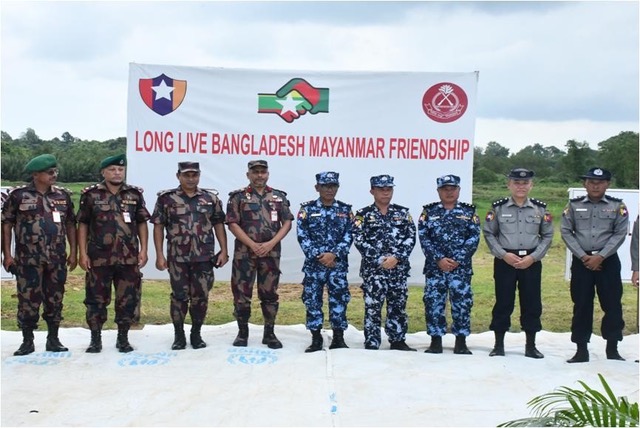DHAKA – Bangladesh has been deepening relations with Myanmar’s junta and ambassador Dr Monwar Hossain has held multiple meetings with the regime since moving to Yangon in July.
Border guards also had a “courtesy meeting” to foster relations.
On September 8, Monwar tweeted about a long discussion with junta chief Min Aung Hlaing on relations with Bangladesh, Rohingya repatriations, promoting trade, connectivity, drug trafficking and health, security and disaster management collaboration.
Monwar said he told the military chief that Bangladesh’s top priority was repatriation, ensuring returnee safety, their willingness and sustainability in Rakhine State.
He tweeted that Min Aung Hlaing expressed his willingness to see “immediate repatriations”.
The Border Guard Bangladesh this month announced a meeting with the junta’s border guards near the friendship bridge to improve existing “friendly relations” and “mutual trust”.
Monwar announced another meeting on September 14 with junta foreign minister Than Swe and international cooperation minister Ko Ko Hlaing, discussing Rohingya repatriations through the regime’s pilot project.”

The ambassador, who is a physician trained at Chittagong Medical College, on September 15 said he met junta health minister Dr Thet Khaing Win on possible cooperation in public health, including a community clinic, pandemic prevention and response, antimicrobial resistance, drowning prevention and the distribution of Bangladesh-produced drugs and medical products in Myanmar.
On September 21, Monwar announced that visa-free travel with Myanmar, suspended because of Covid, was being restored.
Retired Major General Shahidul Haque, who was previously Bangladesh’s defense attaché in Yangon, told The Irrawaddy: “There is tremendous potential for trade and commerce between two countries. Bangladesh can become one of the largest trading partners.
“We can absorb large amounts of agricultural products as well as mining. But the biggest obstacle is the repatriation of 1.2 million citizens from Myanmar. Unless concrete steps are taken, this obstacle will remain. The solution lies in Myanmar.”
Monwar’s meetings have angered Rohingya leaders and rights activists.
John Quinley, director at Fortify Rights, told Irrawaddy: “It’s outrageous that Bangladesh is reportedly collaborating on defense with Myanmar. The junta is an illegal regime.
“Under Min Aung Hlaing’s watch, the military is committing ongoing genocide and crimes against humanity.”
He said the ambassador should push the junta to end military rule, widespread attacks on civilians and release political prisoners.
“The government of Bangladesh is critical in holding Myanmar’s military accountable. Over the last few years, they have allowed [the junta] access to Cox’s Bazar to speak to refugees and gather evidence.”
Monwar should engage the civilian National Unity Government (NUG) as the legitimate administration, Quinley added.
U Aung Kyaw Moe, the NUG’s deputy human rights minister, told The Irrawaddy: “While we appreciate Bangladesh’s generosity, finding a durable solution for the Rohingya is interconnected with the democratization of Myanmar.
“The Rohingya will be not able to go back with dignity and safety and live peacefully if the military is in control. We should learn lessons from 1978 and 1992 when reparations were completed in smaller numbers than now. This is because the military never had good political will.
“The military is falling apart and has no legitimacy, domestically or internationally. These short-term efforts and engagements will cause long-term harm.”
Monwar declined to comment.

















